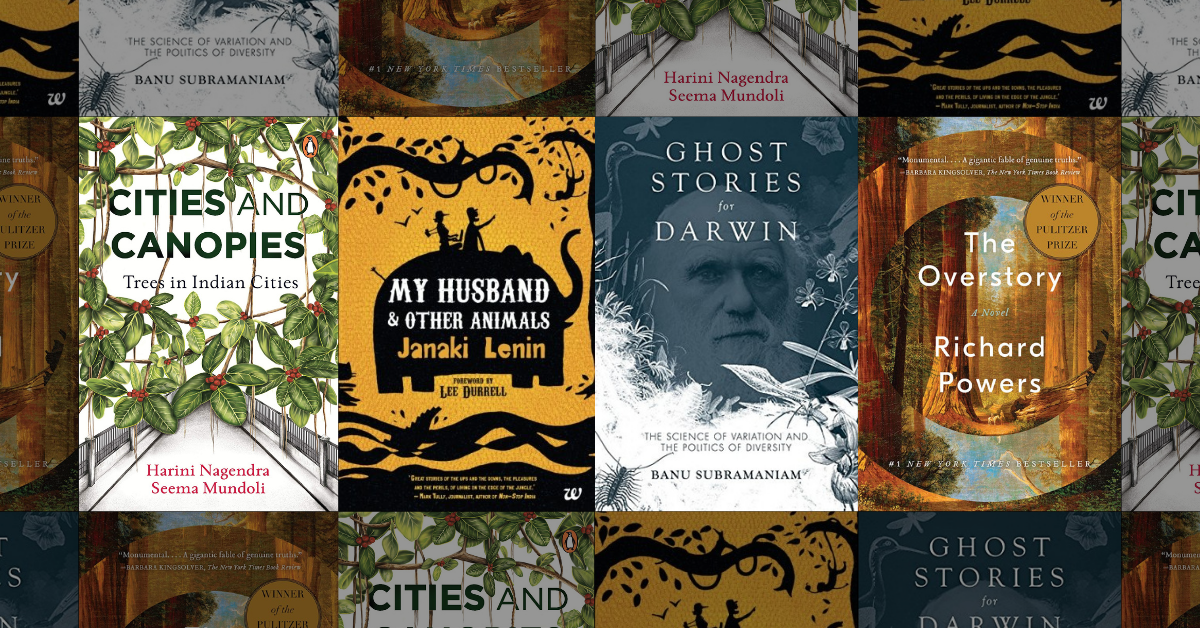Last year I read a few wonderful books on nature. That was one of the good things about the pandemic and the lockdown that followed it. Globally, people observed that animals and birds were coming out into places where human beings and their vehicles cluster in large numbers. At least for a while, people saw clear skies and distant green-clad mountains.
Even in the football ground near my office, I used to notice drongos and kingfishers until students started coming back in the last few weeks. In fact, every morning, from under the tree where I park the car, I used to see a pair of drongos flitting about on the goalpost. On some days, especially the rainy days, the kingfishers also hang out there to grab their morning snacks from the puddles formed in the overgrown grass.
For all its ills, the lockdown was a time to make a connection with the non-human lives around us (let’s ignore COVID-19 for a moment). I will talk about four books that did a lot of good to my mind and soul.
I will start with Cities and Canopies by Seema Mundoli and Harini Nagendra. This is about the trees that you commonly see in Indian towns and cities. We get to know about the Jamun, Peepal, Coconut, Eucalyptus, Moringa and several other trees giving us descriptions that touch our hearts and do not burden our brains. For example, the authors talk about the taste of the fruits, the curries that could be made from parts of certain trees, and the animals and birds that hang out on those trees.
In a fascinating description of the Amaltas, the authors describe the intricate mechanisms by which certain bees pollinate their flowers and how jackals are instrumental in the germination of their seeds. Undoubtedly, a precious contribution to ordinary people’s understanding of ecology.
The next book that comes to mind is My Husband and Other Animals by Janaki Lenin. The closeness the author and her husband, Romulus Whitaker, have with animals is inspiring, to say the least. However, her understanding of the natural world is realistic: she observes that if irritated snakes would bite and salt-water crocodiles would eat your loved one without batting an eyelid (I really don’t know if they bat their eyelids). Once Janaki counted 289 tree frogs in their house and she talks about them in a matter of fact way and with almost no sign of disgust. Guess what she did when she got the smell of frog piss in the pan as she was frying garlic? Read the book to find out!
Also Read: My Aunt’s Story of Healing in Nature
Now comes the novel The Overstory by Richard Powers. One major conceit that we human beings have is that we communicate while others don’t. Although we might allow limited abilities to communicate to some of our cousins in the mammalian world, we don’t often grant that to trees. This novel busts that myth with the powerful story of a woman who was marginalised in academia. It does more; makes us think of forests that are millions of years old and the impending climate crisis; makes us ask why some of us might embrace militant environmentalism. Using a well-crafted story, Powers engages with philosophical questions such as whether human beings are really rational and whether Indian intellectual traditions might offer a more calm and harmonious approach to nature.
I can’t end this without writing about Banu Subramaniam’s Ghost Stories for Darwin. The author, a professor of women’s studies, richly lays out why we should not be satisfied by the scientific world’s dispassionate approach to the objects they study. One of the highlights of the book, in my view, is a fictitious account of how three girls – Tara, Tulasi and Tabrez – living on the outskirts of Chennai study the Morning Glory, trying to get diverse perspectives on the plant, relating it to history, anthropology, physics, agriculture, economics and various other domains.
She presents a strong case for why a narrowly scientific perspective is extremely limiting and persuades the reader to think that our scientists need to learn the humanities (and humanists from the scientists) to understand research questions better. The lack of such conversations can have disastrous consequences. Is it just an accident that many well-known scientists endorsed the pseudo-science of eugenics?
Jobin M. Kanjirakkat teaches English at Vellore Institute of Technology and he loves books and nature.

